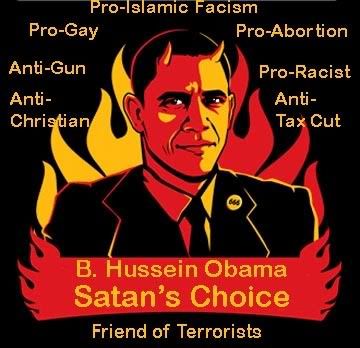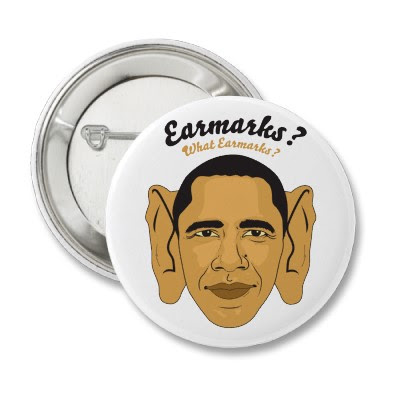Well, it's not like we didn't see this coming...
In a sobering holiday interview with C-SPAN, President Obama boldly told Americans: "We are out of money."
C-SPAN host Steve Scully broke from a meek Washington press corps with probing questions for the new president.
SCULLY: You know the numbers, $1.7 trillion debt, a national deficit of $11 trillion. At what point do we run out of money?
OBAMA: Well, we are out of money now. We are operating in deep deficits, not caused by any decisions we've made on health care so far. This is a consequence of the crisis that we've seen and in fact our failure to make some good decisions on health care over the last several decades.
So we've got a short-term problem, which is we had to spend a lot of money to salvage our financial system, we had to deal with the auto companies, a huge recession which drains tax revenue at the same time it's putting more pressure on governments to provide unemployment insurance or make sure that food stamps are available for people who have been laid off.
So we have a short-term problem and we also have a long-term problem. The short-term problem is dwarfed by the long-term problem. And the long-term problem is Medicaid and Medicare. If we don't reduce long-term health care inflation substantially, we can't get control of the deficit.

You can't just quadruple the national deficit in one year and expect there not to be any consequences.
After being complicit in creating an $11 trillion-dollar deficit during his first four months in office, President Barack Obama admitted in a pre-Memorial Day weekend interview with CSPAN’s Steve Scully, “We’re out of money now.”
Now, it will be interesting to watch for answers to two pressing questions:
* Will President Obama and his Democrat colleagues stop spending us into oblivion? and
* How will the world financial markets react to President Obama’s admission?
Endless Obama deficits threaten dollar’s power
Irwin Stelzer: American Account

The bad news is that President Barack Obama is keeping his campaign promises to raise taxes on upper-income families, borrow and spend, bail out car firms and take control of healthcare.
The good news is that President Obama is not keeping all his campaign promises. There has been no precipitous withdrawal from Iraq, Guantanamo is likely to remain the home of terrorists for some time, the promised “trans- parency” is not so all-encompassing as to include pictures of the treatment accorded the bad guys we captured, and we have not lurched into protectionism.
Recall that during his run for the White House, Obama opposed the trade agreements with South Korea and Colombia, accused the Bush administration of failing to deal with China’s “manipulation” of its currency and threatened to use “the hammer of a potential opt-out” to force Mexico and Canada to renegotiate the North American Free Trade Agreement (Nafta).
Campaigning is one thing; governing is another. “Obama is subject to the same geopolitical imperatives as was President Bush,” said Rod Hunter, who served as Bush’s senior director of the National Security Council and is now a colleague of mine at the Hudson Institute, a Washington think tank. It is one thing to throw raw meat to the trade-union lions during a campaign but quite another to antagonise Canada, which has troops in Afghanistan alongside our own; Mexico, an ally in the war on drugs and potential source of oil; South Korea, important to our efforts to contain its northern neighbour; and other countries.
Related Links
So we have the new Obama. Nafta stays as it is; Treasury secretary Tim Geithner has retreated from his charge that China manipulates its currency; and the president has announced “a plan of action” to obtain congressional approval for pending free-trade agreements with Panama and South Korea, and is in discussions with Colombia’s Alvaro Uribe about getting the agreement with his country through a reluctant Congress. Obama has found he also favours “a strong market-opening agreement for agriculture, industrial goods and services through the Doha round \ and through other negotiations”.
Add to that the repeated statements by the president’s US trade representative Ron Kirk, who has been telling relieved business audiences that trade plays “an important role . . . in creating and sustaining better-paying jobs here at home”. Specifically, Kirk wants to expand trade with the Asia-Pacific region because “there is an extraordinary upside to us” in doing so.
“It is reassuring that Obama’s trade agenda appears to be aligning with those of presidents Bush and Clinton — and to their nine predecessors — rather than to the protectionist positions he took on the campaign trail,” commented Theodore Kassinger, former deputy commerce secretary and now a lawyer with O’Melveny & Myers in Washington.
But before awarding the president the Adam Smith Award For Combating Protectionism, consider this. Obama’s first priority is his domestic agenda: “reform” healthcare, restructure the energy industries, involve the federal government more deeply in education, fight the recession, save the carmakers, control bankers’ bonuses, revise the rules that govern the financial sector, and win what is now his war in Afghanistan. Trade is lower down on the list.
Worse still, there are signs that the president is willing to allow the state politicians in charge of disbursing stimulus funds to adopt “buy American” practices, even though his stimulus bill restricts such practices to those that do not violate our trade agreements or World Trade Organisation (WTO) rules. Local politicians know that WTO bureaucrats don’t vote in their states.
There are also subtle indications that the president will not fight to prevent protectionist measures from creeping into unrelated legislation. Banks receiving bailout money are chafing under rules that prevent them from hiring talented foreign workers. Jamie Dimon, chief executive of JP Morgan Chase, used the company’s annual meeting to denounce these restrictions as a “complete and utter disgrace” that will inevitably invite retaliation against Americans hoping to work abroad.
And Toyota and other foreign firms that make cars here — American jobs for American workers — are in effect discriminated against by the government’s decision to keep GM and Chrysler from meeting the fate to which a free market would consign them.

Nothing Obama will do on trade, either to free up the flow of goods and services, or to tip the scales in favour of American firms, will in the end matter as much as his reckless fiscal policy.
His budgets project deficits close to $10 trillion by 2019 — and that assumes his healthcare plan will cost only the $635 billion “down-payment” he has put in his budget, rather than the $1.2 trillion experts predict, and that he will succeed in almost freezing defence spending.
That means the US Treasury will be peddling billions of IOUs to investors such as China that already have trillions of this paper in their vaults. So far, so good: the recession-induced flight from risk has led overseas investors to seek a haven in dollar assets. But as the printing presses keep running, and the recession eases, investors will find the risk of being paid in dollars that have shrivelled in value too much to bear.
Which is why the dollar hit its lowest level of the year last week and why for a while it cost less to buy insurance against a default by hamburger-seller McDonald’s than against a default by the world’s only superpower. More important, it is why China and Brazil are trying to cobble together a trade deal that will allow them to bypass the dollar completely and pay in their own currencies. This might well be the first step in China’s announced intention to develop a currency to compete with the dollar as the world’s reserve currency.
So, only two cheers for Obama, less of a protectionist than expected, but nevertheless a serious threat to the dominance of the dollar in world trade.
- Irwin Stelzer is a business adviser and director of economic policy studies at the Hudson Institute
stelzer@aol.com


No comments:
Post a Comment